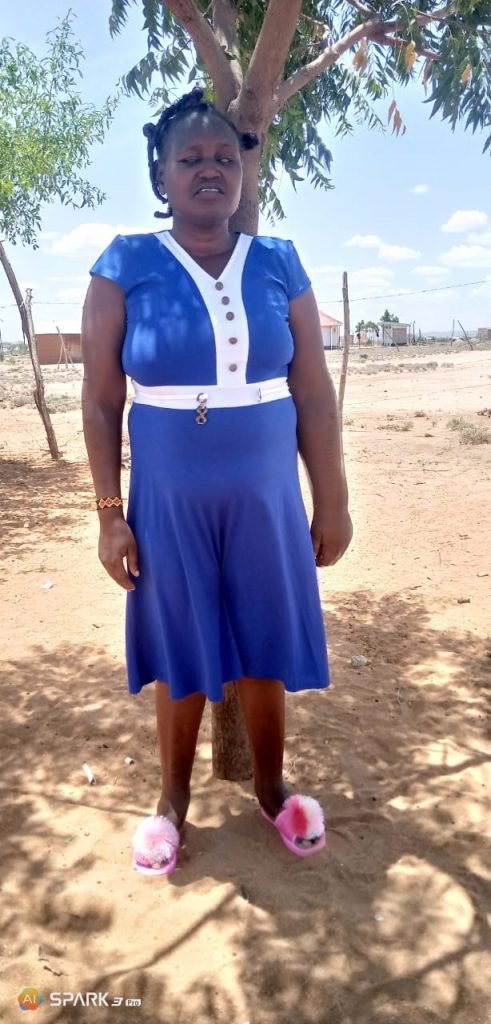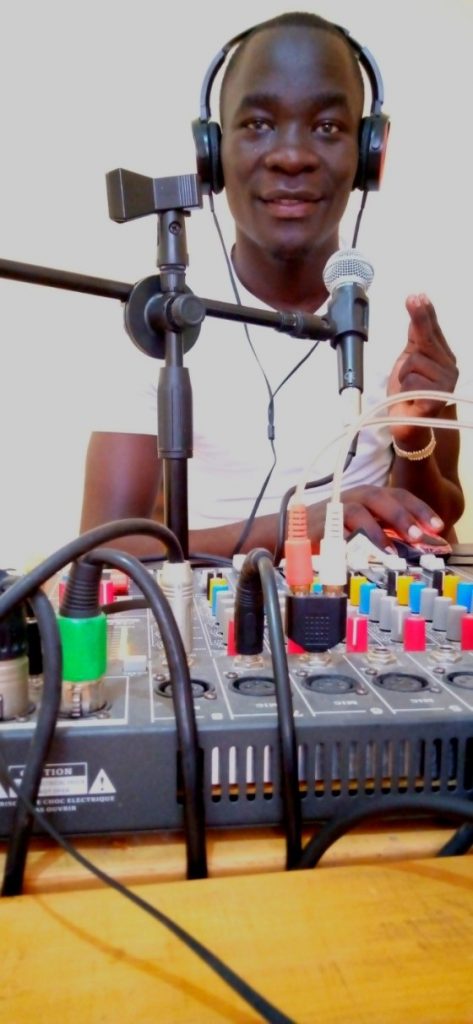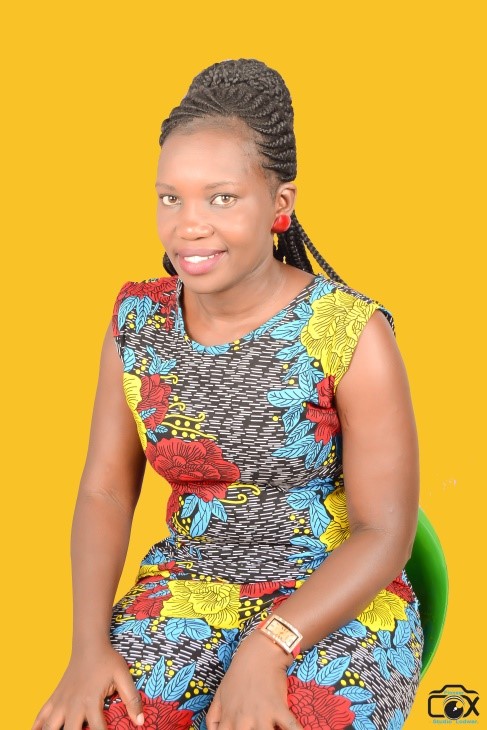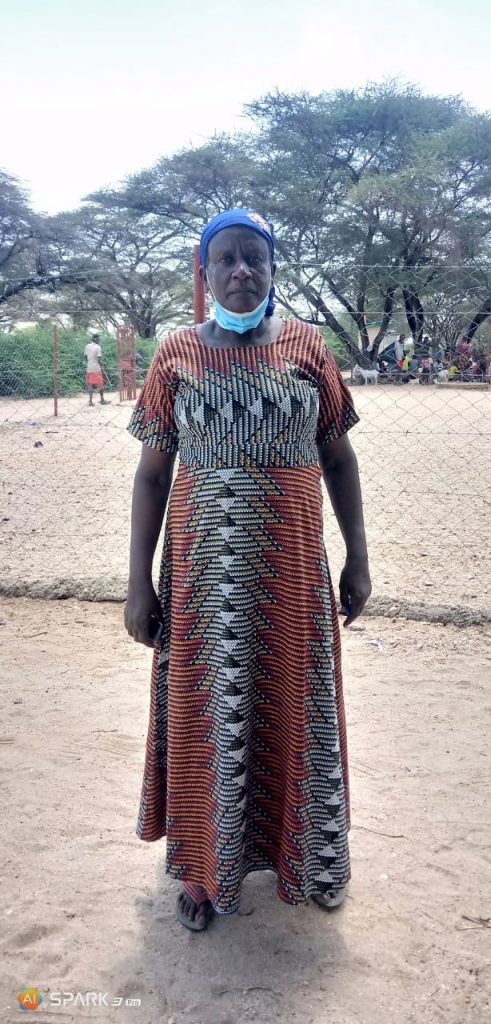What is it like to navigate Covid-19 protocols when one is visually-handicapped?

What is it like to navigate Covid-19 protocols when one is visually-handicapped?
Turns out it is quite challenging but probably not in the way a non-handicapped person would think. We learn from Clare Elim Ame just what an enthusiastically positive attitude can do. With a can-do nature, Clare explains to us that a handicapped person can actually handle Covid-19 challenges, albeit with certain limitations. “I wash my hands and wear my mask. Social-distancing, however, is a little challenging because it’s largely not dependent on me. I can’t see, so I cannot judge whether I’m the prescribed distance from the next person. I’m therefore dependent on the awareness of others to keep the distance.”
Clare, 35, says she has been well-educated by Tumaini Hewani broadcasts which air regularly on Echami FM, a dominant radio station in her Turkana area. “As a person without eyes, a TV would be of no use to me. The radio is my trusted companion. Without radio Echami’s Tumaini Hewani broadcasts, I wouldn’t have sufficient knowledge about Covid-19. It is quite easy for a person with my limitations to be by-passed by important information. People imagine that the things they’re dealing with probably don’t apply to you. The radio therefore comes in handy.”
Clare, a teacher at Smile Together Nursery School, has a helper at home. From time to time, however, she has to leave home to purchase supplies for herself and her 3-year old baby boy. And that’s when the challenges arise.
“When I go shopping, for instance, I communicate with the shopkeeper from what I assume to be one metre away,” she says. “I say what I want, they pack it and give it to me and I pay. Sometimes I ask for a sanitiser and they help me with that. But if I go to a shop and find there are lots of shoppers, I wait aside until they are all done. That way I avoid crowding. Prevention is better than cure.”
The shopping centre is 2 kilometres away. So Clare has to use a boda boda. Occasionally, she doesn’t get off the motorbike, just getting her supplies brought to her after which the bike turns round and returns her home. Yet at all these points, she finds herself dependent upon people’s graces. One would imagine that that exposes her considerably to infection. “That’s why I carry my sanitiser and mask at all times. Echami FM has educated me,” she says with a laugh.
Clare is a free spirit. She talks with enthusiasm and implies by her tone of voice and choice of words that “impossible is nothing,” to borrow that famous Adidas tagline. “I was too young to understand how I lost my sight,” she says. “They tell me it was measles. I grew up an orphan. They tell me mom died before I could sit. My father was a traditional man who couldn’t bring himself to bring up a child without the mother’s help. So I was brought up in a children’s’ home by a church-based NGO. My father used to visit me. He died. I’m single but I have my son.”

Getting the story back on to Covid matters, I ask her what she thinks of the status of Covid-19 in Turkana County. She says that though Echami FM has helped educate people, challenges exist, particularly due to water scarcity. “Water is not plenty in Turkana,” she says. I ask about Lake Turkana. “It’s not near. I live in Lokichar and Lake Turkana is in Lorokan. We don’t have water as such. If water was available, it would be easier to keep hygiene.”
She further reveals that the people who live in the interior might not have access to radio. Covid-19, she says, might be something they’ve never heard of. “I’m a fan of Echami FM and I’ve understood what Tumaini Hewani says and I’m fairly able to protect myself. But not everyone has access to this information. The important thing, however, is that everyone around here seems to take it seriously. So may be with that they’re protecting the people in the interior.”
Clare participates in call-in programmes on Echami FM on Covid-19. She says that by the number of callers and the questions asked, she knows the local people are curious about the Novel Corona virus.
Noah Okiru, a presenter at Echami FM says the evidence of the effectiveness of the Tumaini Hewani broadcasts is in the number of masked people in the streets.
“Before the radio broadcasts, people were bewildered. The details about the disease, its mode of spread, the information that it was particularly dangerous to old people – these things really intrigued locals. For a time you heard people say that it was all a scum. Naturally, reports of government officials stealing money and equipment for Covid-19 have not helped. Yet the number of people wearing masks and socially-distancing is notably growing.

Echami FM station manager Lydia Olola corroborates this story but from a different angle. First, she explains that the reason people initially reacted with scepticism to reports of Covid-19 was that they didn’t know of any infected people. “The initial reports talked of infected truck drivers but nobody knew them,” says Lydia. “Some dismissed Covid-19 as a Nairobi disease. Gradually, however, we have seen people respond to our radio messages by masking, sanitising and socially-distancing.”
One of the negative outcomes of the increasing acceptance of Corona virus’ existence is that pregnant women and mothers have avoided going to health facilities for essential services. “I have actually had to speak with some of my neighbours to tell them that the facilities were safe and it was vital that they go for the essential health services,” Lydia explains.

Lokichar Location Chief Josephine Akiru says the fear by women to go to health facilities must not be let to downgrade the importance of the Tumaini Hewani broadcasts. “The broadcasts have made a difference for our people,” says the chief. “Radio Echami has helped us to keep the community safe by disseminating self-protection information.
Madam Akiru explains that water is not plentiful around their place. The radio broadcasts that give people alternative ways of self-protection are therefore invaluable. “Even though public health officials go round inspecting public places to enforce protocols, it’s all not effective if people don’t believe and participate in it. Radio Echami has educated people on how to behave in public and people are listening.”
Our Services
Brochures
View our Centre for Behaviour Change and Communication Portfolio.













